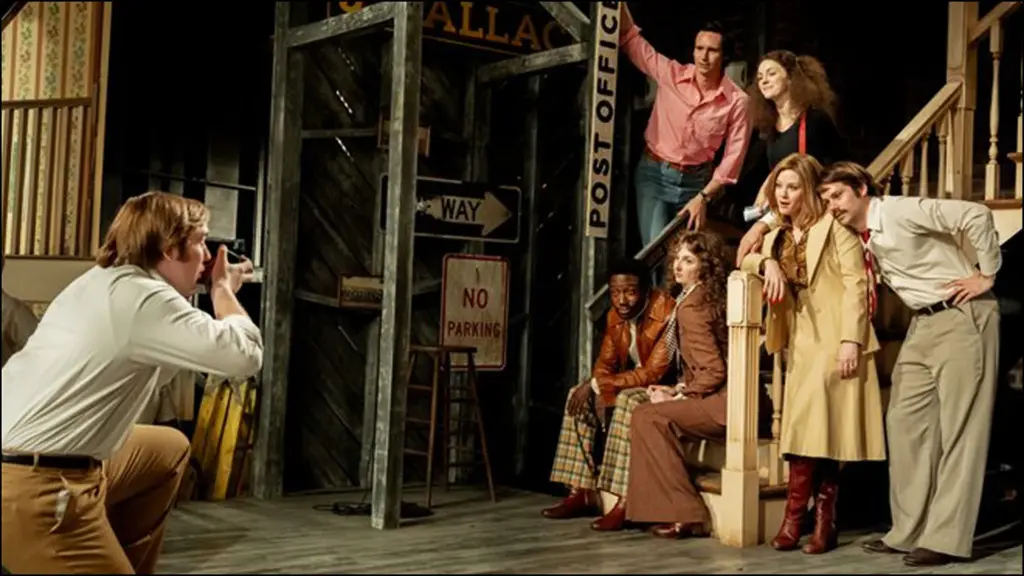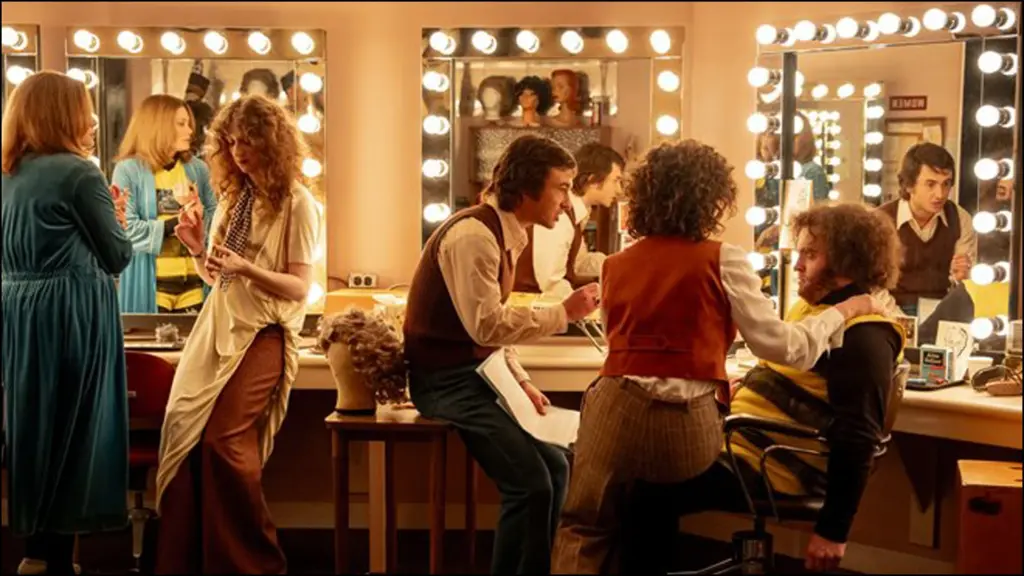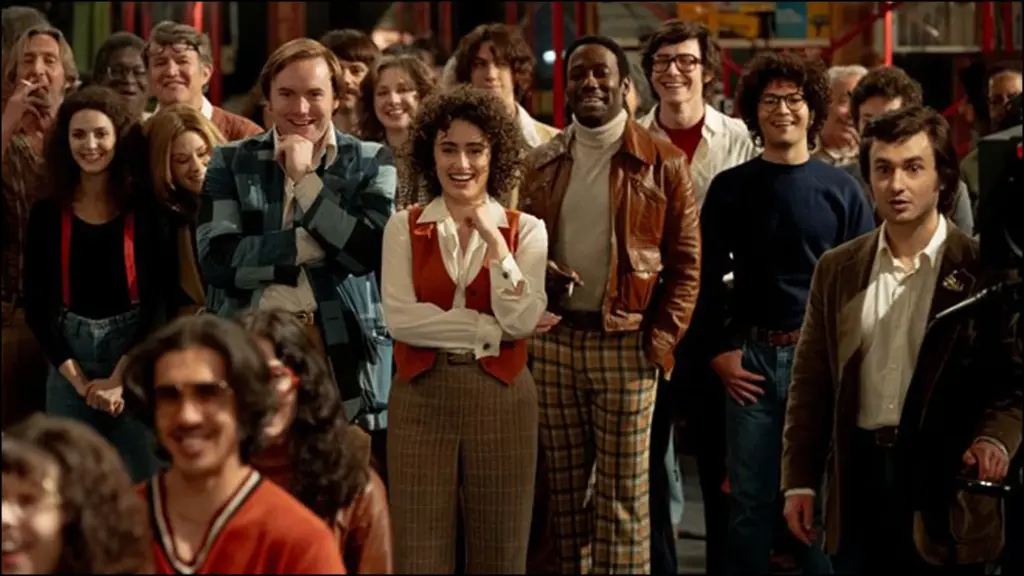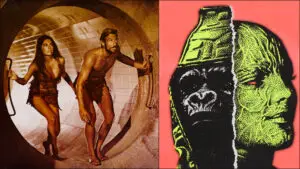There’s nothing special about a bad movie. Dozens hit theaters every year. But Saturday Night, the new film from writer/director Jason Reitman is not just bad – it’s annoying. And that’s a unique feat.
Just in time for SNL’s 50th anniversary, Saturday Night follows famed SNL creator Lorne Michaels (Gabriel LaBelle) on the night of October 11, 1975, reimagining the final 90 minutes before its first episode aired. In the tradition of Aaron Sorkin’s walk and talk, Reitman attempts to create a heart-pounding 16mm portrait of an underdog producer butting up against the studios, a feel-good story for the ages where we all know the little guy wins. The result is one of the most myopic hagiographies ever produced – an unendurable slog weighed down by woeful reenactments of classic sketches, odd takedowns of beloved figures now deceased, and a protagonist whose only discernible flaw is his exasperation with the greatness of his own vision.
To be clear: Saturday Night isn’t really a story. By any traditional metric, it’s barely a movie. It’s not a history, but a prequel to the modern day, an endless string of enraged executives telling Lorne Michaels that he won’t win, or Chevy Chase (Cory Smith) that he won’t be famous, with enough wink-wink-nudge-nudging to leave your ribs bruised. If the assumed cultural knowledge of SNL’s success were taken away, Saturday Night would be virtually nonfunctional.
Within minutes of the film’s opening, while fast-talking in an elevator, Michaels compares himself to Thomas Edison inventing the light bulb. Far from illuminating Michaels’ egotism, it’s a declaration of stakes. Reitman wants you to know: this is a movie about a man who changed the world, full stop.

For the next 109 minutes we are treated to a similar dearth of nuance, and along the way Reitman finds time to devise wildly unflattering portrayals of George Carlin (Matthew Rhys), Jim Henson (Nicholas Braun), Johnny Carson (Jeff Witzke), and a half-dozen other icons too dead to set the record straight.
When not willfully deprecating his subjects, Reitman nevertheless manages to do radical disservice to the likes of John Belushi (Matt Wood), Gilda Radner (Ella Hunt), Dan Aykroyd (Dylan O’Brien) and a host of other legends, by assembling a cast without a whit of the original’s verve. The entire product is so asinine that it’s difficult to lay the blame solely on the performers; still, Belushi in particular was such an undeniable power that this limp rendition feels borderline offensive.
Not only is the cast at large unable to fill the long shadow of the real figures they portray, they are then forced to literally reenact a number of their original timeless sketches. While the performers fumble their way through these embarrassing recapitulations, we are shown the rest of the cast watching, their eyes full of light and laughter, as they understand the magic unfolding before them. Here’s the thing: watching other people laugh doesn’t make something funny. It’s a similar misunderstanding to 2017’s The Disaster Artist. It was funny when Wiseau did it. It’s not funny if you just do it again.

In place of tension, we’re left with unending whip pans between celebrity cosplays, and as with Damien Chazelle’s disastrous Babylon (2022), another contemporary embarrassment of questionable new talent lionizing the old, Reitman seems to have confused an aggressive percussion section with a sense of actual momentum. Though Saturday Night lasts a modest runtime by today’s standards, and constantly displays a literal ticking clock, the product feels infinitely longer because – nothing – happens.
Though Michaels is written as a one-dimensional saint martyring himself on the cross of American television, LaBelle does the best he can with what he’s given. Rachel Sennott is oddly charming as Rosie Shuster, Michaels’ estranged wife, and Cooper Hoffman is sympathetic as Dick Ebersol. Of the SNL cast themselves, Lamorne Morris as Garrett Morris (no relation) is by far the most memorable, and if Saturday Night gets any laughs, they’re his. Willem Dafoe (as Dave Tebet) and J.K. Simmons (as Milton Berle) could both make magic out of a shoebox, and they sure try.
Succession’s Nicholas Braun is tasked with playing both Henson and Kaufman, an odd choice that never comes together comedically or thematically. Braun too does his best, but Henson is only there to be made an ass of for caring about puppets, and Kaufman’s single opportunity for a laugh is, again, when he must go through the motions of reenacting his famous Mighty Mouse bit. Nicholas Braun is lovely – but he’s not Andy Kaufman.
An old adage holds that you should never show a better movie in your movie. Let’s extend that: you should never reenact a better movie in your movie.














